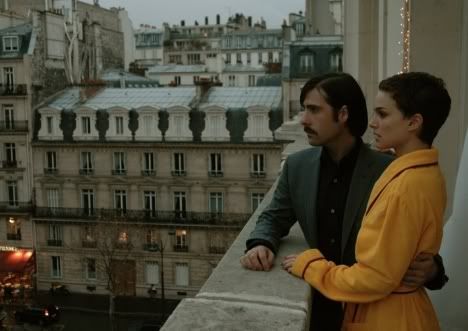It's nice to begin your day with rainbow-inspired art—that's what I always say. It starts your morning on the right foot. Or the left, depending on your preference. So, with that in mind, artist Jen Stark turns ordinary paper into kaleidoscopes of color that rival Joseph's Technicolor dreamcoat.

The New Yorker ~ There's not a graceful way to segue from rainbows to World War II, but here goes: using well-crafted sentences, Nancy Franklin trashes Ken Burns's latest documentary, "The War."

New York Magazine ~ Sam Anderson discusses Philip Roth's Exit Ghost, in which Roth kills off his alter-ego, Nathan Zuckerman. So it goes.

The New Yorker ~ There's not a graceful way to segue from rainbows to World War II, but here goes: using well-crafted sentences, Nancy Franklin trashes Ken Burns's latest documentary, "The War."
You have to work very hard, and take yourself very seriously as the keeper of the keys to America, to make a tedious documentary about the Second World War. But that is what Ken Burns and Lynn Novick have done with their fifteen-hour series “The War,” which will begin on September 23rd, on PBS. They’ve taken a subject that is inexhaustible and made it merely exhausting.New York Magazine ~ David Amsden hangs out with Wes Anderson, whose new film, The Darjeeling Limited, hits theaters this week.
Anderson often finds himself in situations like this: real-life circumstances that have the same absurd, art-directed quality as his films. You may be tempted to shake your head and simply say that Anderson has been incredibly lucky, which is true, but that doesn’t give enough credit to his talents—not just as a director, but more generally as someone who has constructed a life almost preposterously conducive to the pursuit of fantastical whims. When he was editing Darjeeling, for instance, he convinced Fox Searchlight to rent him a suite at the Inn at Irving Place, an unmarked hotel on Gramercy Park designed to re-create an era of faded glamour that probably never actually existed. Given that Anderson owns a spacious loft in the East Village that doubles as a work space, and that the studio could have rented any number of generic editing rooms for significantly less money, the logic behind this could be considered questionable./Film reports that Wes Anderon's short film, Hotel Chevalier, is being released via iTunes. The mini-movie is a "semi-prequel" to Darjeeling and stars Natalie Portman and Jason Schwartzman.

New York Magazine ~ Sam Anderson discusses Philip Roth's Exit Ghost, in which Roth kills off his alter-ego, Nathan Zuckerman. So it goes.
Zuckerman is haunted all over Manhattan by the ghost of his virility. He’s wrestling now not with actual desire—of which he’s become, over the years, an expert wrangler—but with a more confusing and humiliating force: what he calls “the ghost of my desire.” My reading of Exit Ghost was as volatile as a Roth affair. By page 13, I’d whipped myself into an orgasmic frenzy of marginalia (“heartbreaking, honest, human”), after a poignant micro-biography of Zuckerman’s neighbor Larry, who lives his entire life based on a script he wrote out when he was 10. But soon I relaxed into quieter arousal. The book is like a thoroughly shuffled deck of cards, with moments of perfect psychological clarity and piercing vignettes and bleak wisdom surrounded by all kinds of tedium.TimesOnline ~ Stephen Amidon presents "A guide to Philip Roth."
The fame and controversy that arrived after the publication of Portnoy’s Complaint was so intense that Roth felt compelled to create a fictional surrogate to take the heat – Nathan Zuckerman, a Jewish writer who himself became notorious after writing a book called Carnovsky (whose plot sounds suspiciously like that of Portnoy’s Complaint). Zuckerman, who has so far featured in 10 of Roth’s books, can perhaps best be seen as a sort of pressure-release valve for his creator – the critic Michael Wood refers to Zuckerman as Roth’s “alter id”. He is a surrogate who allows Roth to write about his own emotional and intellectual life without indulging in pure autobiography.And that's the roundup.
